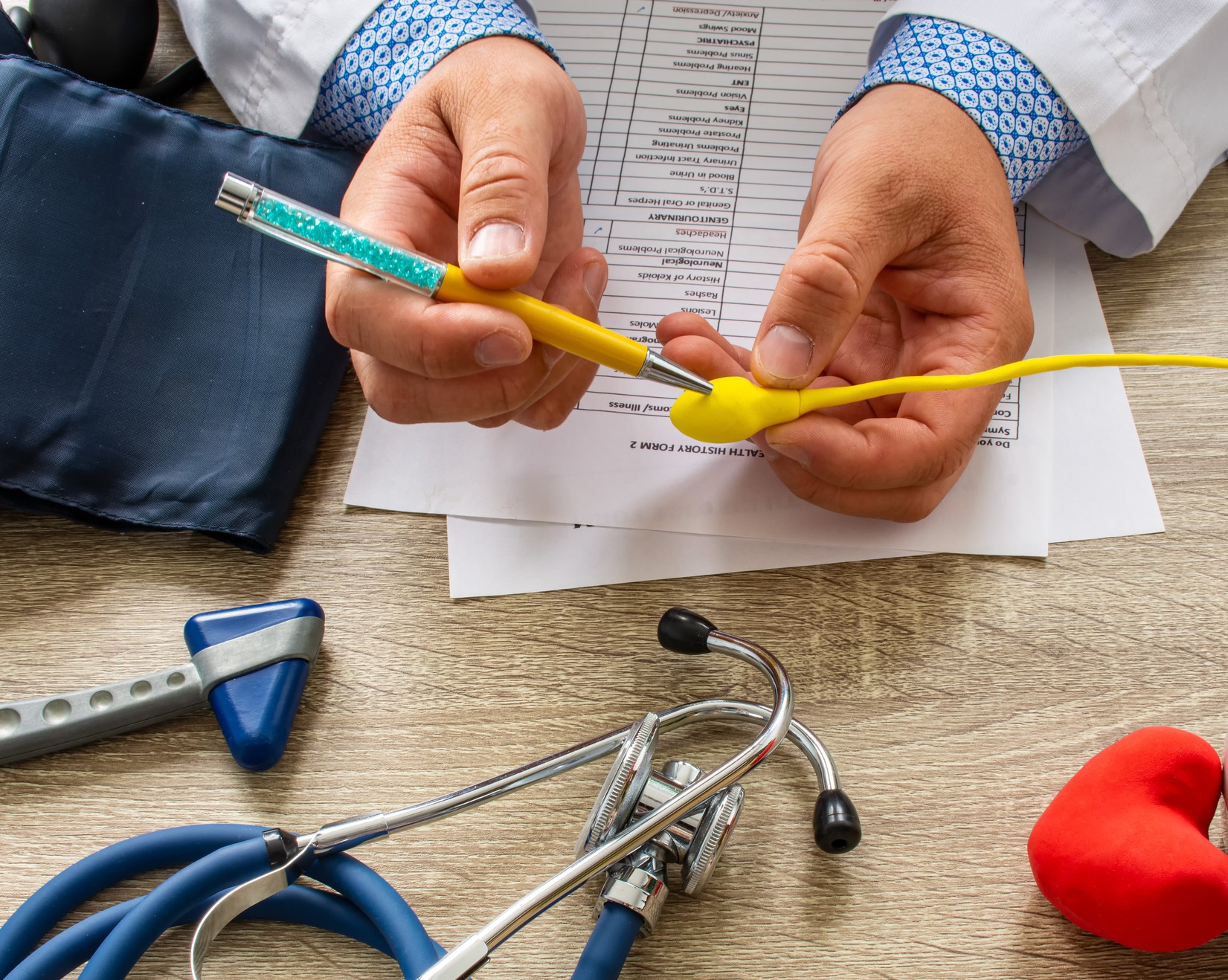-

Couple doing vasectomy reversal research.
Are You Having Second Thoughts?
Sometimes, men have a vasectomy, thinking they don’t want any more children, but then have second thoughts. About 300,000 men in the United States have vasectomies each year, and somewhere between three and six percent of those men later decide to reverse those vasectomies. In the past, this was a long shot. Today, vasectomy reversal is safe and effective. But is it the right option for you? Here are some factors to consider when making the decision.
Conception is Not Guaranteed After a Reversal
Vasectomy reversals are much more successful than they used to be, but no procedure is 100 percent perfect. Sometimes, it takes up to 12 months for a stable semen analysis test, and sometimes other factors make conception difficult. Your partner’s age and fertility status come into play, as do things like testicular issues, the length of time since the vasectomy was done, and problems with the vasectomy itself.
There May Be Health Risks
Serious complications are rare with vasectomy reversal, but they do sometimes occur. Bleeding within the scrotum, infection at the surgery site, and chronic pain can all result, though they are uncommon.
Vasectomy Reversal Can Be Costly
Vasectomy reversal can be expensive, even without considering costs like anesthesia fees. What’s more, health insurance often will not cover it. Talk to your fertility specialist about the cost, and make sure there are no surprises when you receive your bill.
Finding the Right Surgeon is Important
Vasectomy reversal is a complicated procedure, involving complex microsurgery. Ultimately, the original surgery can have a major impact on the reversal. For a successful reversal, choose an experienced, trained microsurgeon. Ask about the success rates of any surgeon you are considering, and check credentials before committing.
Three Vasectomy Reversal-Friendly Situations
- Your life has changed significantly. Maybe you’ve become a widower, or you’ve divorced, and now you’re remarried. Maybe you have lost a child. Whatever the reason, if your life changes make you re-evaluate the decision not to have more children, a vasectomy reversal may be the right choice.
- You’ve had a sincere change of heart. You might have been 100 percent sure, earlier in life, that you didn’t want children or that your family was complete already. Now, later in life, you’ve come to regret that decision. Vasectomy reversals can be reversed many years after the original procedure, so if you have changed your mind, talk to a specialist about whether a vasectomy reversal is right for you.
- The vasectomy has caused issues for you. Sometimes, men experience complications following a vasectomy. This is not common, but if it does happen, your surgeon may recommend a vasectomy reversal to correct the problem.
Fertility Experts Offering Exceptional Patient Care
At the Center for Vasectomy Reversal, we pride ourselves on helping men improve their fertility through uncompromising, concierge-level patient care. Under the direction of Dr. Joshua Green, our team provides state-of-the-art treatment for men who need a reversal of their vasectomy or have other fertility concerns. To learn more, contact us through our website or call 941-894-6428.
-
How Vasectomy Reversal Procedures are Performed

Vasectomies are a common procedure for couples who have completed their families, in part because they’re a simpler procedure than a tubal ligation. Sometimes, however, men change their minds after they’ve had a vasectomy. It could be that the couple decides they want another child, or gets a divorce, but whatever the reason, it’s now possible for men to have their vasectomies successfully reversed. Vasectomy reversal, however, is a more complicated process.
The most common procedure to reverse a vasectomy is the vasovasostomy. This is a surgical reconnection of the vas deferens, the tube that carries sperm away from the testes. Generally, there’s a vas deferens on each side of the body, about the diameter of a strand of spaghetti, and these tubes are divided when a vasectomy is performed. Sperm production doesn’t stop after a vasectomy, but the sperm are no longer able to leave the body. A vasovasostomy allows ejaculation to occur again.
To perform a vasovasostomy, the surgeon makes a small incision in the scrotum. The vas deferens is isolated and dissected microscopically, divided above and below the obstruction caused by the vasectomy. The fluid from the testicle side is examined, and if it contains sperm, the surgeon reconnects the two ends of the vas deferens. This is done using multiple layers of micro suture and a powerful surgical microscope that magnifies the vas deferens to about 40 times its size. Once the vas is placed back into the normal position, a small drain is inserted in each side and the incision is closed with absorbable suture. The drains are removed the next day.
If there’s no sperm present in the fluid, the issue could be scar tissue that’s blocking the flow of sperm. If that’s the case, the surgeon may have to perform a more complicated procedure, called a vasoepididymostomy. There’s no way to know before surgery which procedure will be needed, so it’s important to find a surgeon capable of performing both. A vasoepididymostomy involves connecting the vas deferens to the epididymis. The longer it’s been since the vasectomy, the higher the possibility that a vasoepididymostomy will need to be performed.
The chances of a vasectomy reversal being successful are fairly high. If the vasectomy happened less than five years ago, there’s a greater than 95 percent chance that the ejaculate will contain sperm. Between five and ten years, it drops to about 90 percent, but even after ten years, the success rate is still between 80 and 90 percent. The chances of a successful pregnancy depend on several different factors, but with the help of a competent surgeon, many fertility issues can be overcome.
At the Center for Vasectomy Reversal, we pride ourselves on providing optimal surgical results and uncompromising, concierge-level patient care. Under the direction of Dr. Joshua Green, our team provides state-of-the-art treatment for men who need a reversal of their vasectomy or have other fertility concerns. To learn more, contact us through our website or call 941-894-6428 for a free consultation.
-
Fun Things to Do Around Sarasota with Your Kids this Summer

Are you headed to the Gulf coast of Florida with your family this summer? Don’t miss out on all that Sarasota has to offer. Here, we offer some suggestions of fun things to do.
- Check out some marine life. The Mote Marine Laboratory and Aquarium is both fun and educational, with all sorts of exhibits from coral reefs to sea jellies to river otter and alligators. You’ll enjoy seeing manatees and sea turtles, but the really exciting event happens Mondays, Wednesdays, and Fridays at 11am, when the trainers feed the 135,000 gallon tankful of sharks.
- Have a jungle adventure. Sarasota Jungle Gardens, a family-owned local zoo, has 200 species, including parrots, snakes, lemurs, and alligators. Big Cat Habitat is an animal sanctuary that focuses on housing big cats like tigers and lions but also has non-cat species like bears, monkeys, sloths, foxes, wallabies, and more.
- Do some science. The Suncoast Science Center has a state-of-the-art lab with classes that allow school-aged kids to do experiments they wouldn’t otherwise be able to do. The state-of-the-art equipment in the lab can help them with experiments that they wouldn’t be able to do at home.
- Stroll through a garden. The Marie Selby Botanical Gardens cover 15 acres in the former home of Marie and William Selby. Added to the National Register of Historic Places in 1998, it’s got beautiful displays of vibrant flowers in exhibits like the Orchid Show, the Tropical Conservatory, or the Children’s Rainforest Garden.
- Visit a park. There are plenty of parks from which to choose in Sarasota, so pick one and have a ball with your family! Urfer Park has a playground, fitness equipment, hiking and biking trails and, if you go far enough in, wetlands and cows. Oscar Scherer State Park features hiking, camping, picnicking, rollerblading, snorkeling, paddling, and more. Myakka River State Park is one of the largest parks in Florida, and offers camping, bird watching, horseback riding, and wildlife viewing.
- Visit a circus museum. Sarasota used to be the winter home of the Ringling Brothers Barnum and Bailey Circus. Today, The Ringling is the official state art museum of Florida, with extensive grounds and a vast collection of artworks. There’s also the Circus Museum, where your kids will love exploring a collection that includes performer wardrobes, props wagons, and more.
- Walk through the trees. Have a fun adventure with your kids at TreeUmph, an elevated outdoor park nearby, in Bradenton. Swinging around in the park’s aerial courses, you’ll cross suspended bridges and do zip line courses with crazy obstacles.
At the Center for Vasectomy Reversal, we love families, and we love helping people build their families! We pride ourselves on providing optimal surgical results and uncompromising, concierge-level patient care. Under the direction of Dr. Joshua Green, our team provides state-of-the-art treatment for men who need a reversal of their vasectomy or have other fertility concerns. To learn more, call 941-894-6428 or contact us through our website.
-
How to Increase Male Fertility

If you and your partner are struggling to conceive a child, you’re not alone. About one in six couples struggles with infertility, and one in three cases is due to a problem with male fertility. There are some natural remedies you can try, though, that may boost your chances of conception.
- Load up your diet with healthy foods. Eat plenty of fruits and vegetables, focus on getting antioxidants and healthy fats. Limit your intake of saturated fats and red or processed meat. And be careful about eating soy, because it contains plant estrogen, which can reduce testosterone bonding and sperm production.
- Take your vitamins and minerals. Though the mechanism behind it is not completely understood, research indicates that vitamin D and calcium can impact sperm health. Vitamin C improves fertility by relieving oxidative stress in the body. Additionally, limited studies suggest folate and zinc can improve sperm concentration, count, and overall health.
- Quit smoking. Smoking is bad for every part of the body, so it should come as no surprise that it’s bad for your fertility. In fact, recent research indicates that smoking consistently reduces sperm count and people who smoked moderate or heavy amounts of tobacco had lower sperm quality than non-smokers or even light smokers.
- Watch the alcohol and drugs. Don’t drink to excess, don’t do any illegal drugs, and be mindful of your prescriptions. Some antibiotics, anti-androgens, anti-inflammatories, antipsychotics, opiates, antidepressants, anabolic steroids, supplementary testosterone, and methadone can all negatively affect your fertility. If you’re concerned about a medication you’re taking, talk to your doctor.
- Keep your cool. High temperatures can damage sperm, so if you’re trying to conceive don’t hold your laptop in your lap, wear tight underwear, or soak in hot tubs. Prolonged sitting and using car seat heaters can also cause overheating.
- Consider a supplement. Certain herbal supplements may be beneficial to fertility, including fenugreek, maca root, tribulus terrestris, and Indian ginseng. D-aspartic acid, a type of amino acid, may also be helpful.
- Reduce your exposure to environmental contaminants. Poor air quality and environmental toxins have been shown to decrease male fertility. Additionally, men in jobs with exposure to chemicals and overheating, like farmers, painters, varnishers, metalworkers, and welders, had higher incidences of infertility than other groups.
- Manage your stress. Stress raises cortisol levels, and cortisol lowers testosterone.
- Get some exercise and some sleep. For each, the key is to get just the right amount- not too little and not too much. Getting enough exercise and enough rest can improve your sperm count. It can also help you lose weight, which can improve your fertility.
If you’re struggling with infertility, call the Center for Vasectomy Reversal, where we love helping people build their families! We pride ourselves on providing optimal surgical results and uncompromising, concierge-level patient care. Under the direction of Dr. Joshua Green, our team provides state-of-the-art treatment for men who need a reversal of their vasectomy or have other fertility concerns. To learn more, call 941-894-6428 or contact us through our website.
-
Cost of Vasectomy Reversal

The technology involved in a vasectomy reversal has improved significantly over the past few decades. In fact, the surgical techniques used today are nothing short of miraculous. If you’ve had a vasectomy and now would like to start a family, you have a very good chance after undergoing vasectomy reversal. Still, the procedure can be cost-prohibitive, since most infertility procedures are not covered by insurance.
Dr. Green is an extremely skillful surgeon, and his vasectomy reversal results speak for themselves. He’s fine-tuned his skills over years of clinical practice, performing hundreds of vasectomy reversals. Every patient receives personalized care, and even receive Dr. Green’s personal cellphone number.
When you schedule a vasectomy reversal with us, a non-refundable fee of $1,000 is required to reserve the operating suite and high-powered microscope. If you need to reschedule, you can do so once at no charge, as long as it’s at least three weeks before your scheduled surgery date. To reschedule again, there will be an additional reservation fee, which will be applied to the total cost of the surgery.
The cost of a vasectomy reversal is $7,250.00. This includes our surgeon’s fee, surgery center, anesthesia, all consultations, and office visits. Once you’ve paid your initial fee, the balance is due one week prior to surgery. If Dr. Green determines that you require a vasoepididymostomy, no extra fee will be charged. We accept major credit cards, cash, and checks. We also offer a discount of $250 to active duty service members.
Dr. Green offers a payment plan option for those unable to pay the entire fee at once. With this plan, patients are still required to make the $1,000 deposit, and will pay a total of $7,500. $3,500 is due one week before the surgery, and the remainder is broken into six monthly payments of $500 each, beginning the month after the surgery.
If you’re traveling from out of town, many pre-operative details can be handled over the phone, online, or via mail or email. Dr. Green will meet with you before the surgery if it’s convenient, or will talk to you on the phone and meet you at the surgery center on the day of your procedure. You don’t have to stay in Sarasota, as long as you can be at the surgery center by 11:30 on your scheduled surgery day, you’ll be available for a post-operative appointment the next day, and you have someone to drive you home. If you do decide to stay in Sarasota, we’ve negotiated a discounted rate for our patients with the Hampton Inn Sarasota, across the street from the surgery center.
At the Center for Vasectomy Reversal, we pride ourselves on providing optimal surgical results and uncompromising, concierge-level patient care. Under the direction of Dr. Joshua Green, our team provides state-of-the-art treatment for men who need a reversal of their vasectomy or have other fertility concerns. To learn more, call 941-894-6428 or contact us through our website.
-
How to Baby Proof your Home

When you are about to have a baby, it can be alarming to look at all the hazards in your home. Your space, which has always seemed benign or even inviting, may now seem like a virtual deathtrap, with danger lurking everywhere. Relax! It’s not as bad as it may seem, and babyproofing is not too overwhelming if you take it step by step.
- First, think about the reasons behind babyproofing. It’s important to keep hazards out of the way of children, not just to keep the little ones safe, but also to make it easier to parent. It’s no fun to constantly say “no”, but you can set yourself and your child up for success by creating an environment that’s comfortable and safe.
- Look for major hazards throughout the house. Anything broken, paint that’s chipped or peeling, wallpaper that’s coming unstuck- fix those things. Make sure your water heater is set below 120° F, and that your smoke and carbon monoxide detectors are in good working order. If you live in a home built before 1978, check for lead paint; hire a lead-safe contractor to fix it if you find it. Cover electrical outlets and secure any piece of furniture or heavy electronic item that could tip, using safety straps or anchoring things to the wall. If you use window blinds, consider choosing cordless blinds. If your existing blinds have cords, use cord safety wraps.
- Keep small children out of the bathroom. Babies and toddlers are drawn to water, which makes toilets, sinks, and bathtubs hazardous. Additionally, bathrooms tend to have cleaning supplies and medications. The best course of action is to secure the cabinets, drawers, and toilets with child locks and then put a doorknob cover on the outer handle.
- Kitchens need special attention. Install magnetic childproofing locks in the cabinets, secure drawers, and lock hazards like liquor cabinets and medicine cabinets. Use stove knob covers and turn the handles of pots and pans inward so a child can’t grab them and pull down hot food. Store cleaning supplies, including laundry detergent, out of children’s reach. Put non-skid pads under rugs and find a way to contain children while you’re cooking.
- Do a sweep of the whole house. In the nursery, make sure your crib is safe with crib rails at the appropriate level and no toys, blankets, or bumpers in the crib. Choose a toy box that’s safe, with no heavy lid, and put finger guards on door hinges. In the living areas, pad corners of furniture, skip tablecloths because of the danger of kids tugging on them, and install window guards.
At Center for Vasectomy Reversal, we love helping to create healthy, happy families. Under the direction of Dr. Joshua Green, our team provides state-of-the-art treatment for men who need a reversal of their vasectomy or have other fertility concerns. To learn more, contact us through our website or call 941-894-6428 for a free consultation.
-
Different Vasectomy Reversal Surgical Options

If you’re considering a vasectomy reversal, you should be aware that there are different surgical options used to complete the procedure. Vasectomy reversal is complex and detailed, requiring expertise and focus from the surgeon. That’s why it’s important to find a surgeon with the experience and knowledge necessary to choose the right one for you and perform it skillfully. Which procedure will you require, and what will it entail?
The most straightforward type of vasectomy reversal is the vasovasostomy. This is what most men can expect when they go in for a vasectomy reversal. In this procedure, the scar tissue from the vasectomy is removed and the ends above and below the portion that had been blocked are sutured back together. The opening being reconnected is extremely small, between .7 mm and .4 mm in diameter, so extreme skill is required to perform this procedure.
For some men, the time frame since their vasectomy might be so long or the blockage from the vasectomy might be so low that a vasovasostomy is not possible. In these cases, a vasoepididymostomy is performed. This is a much more technically challenging surgery, requiring microsurgical expertise, and only the most experienced, specially-trained surgeons can perform it. In this procedure, the upper end of the vas deferens is connected to a tubule of the epididymis, the structure that connects the testicle to the vas deferens. The opening connected in this procedure is about 1/10th of the one made for the vasovasostomy, so it’s a much more delicate microsurgery. In addition to the difficulty of the procedure being high, the success rate is lower than that of the vasovasostomy. For these reasons, this procedure is only done if absolutely necessary.
There is a third done for men who have had a vasectomy and now wish to father a child. It’s called microscopic epididymal sperm aspiration (MESA), and it’s only an option for those couples who are choosing to undergo in vitro fertilization. Sperm aspiration, like the two kinds of vasectomy reversal, is done using an operating microscope. This enables the surgeon to successfully obtain sperm directly from the epididymis without contamination from blood and bodily fluids. Using the operating microscope, the surgeon is able to see the epididymal tubules clearly, so the success rates are extremely high and there’s very little risk of damaging adjacent structures.
At the Center for Vasectomy Reversal, we pride ourselves on providing optimal surgical results and uncompromising, concierge-level patient care. Under the direction of Dr. Joshua Green, our team provides state-of-the-art treatment for men who need a reversal of their vasectomy or have other fertility concerns. To learn more, contact us through our website, or call 941-894-6428 for a free consultation.
-
Reasons Why Men Get Vasectomy Reversals

As many as 500,000 vasectomies are performed in the United States each year, making it a fairly common procedure. It’s not surprising that the numbers would be high, since a vasectomy is a simple outpatient procedure. Interestingly, between six and ten percent of men who opt for a vasectomy later change their minds and have the vasectomy reversed. Why do men get vasectomy reversals? And are those reversals successful?
The reasons for a vasectomy reversal are personal and varied. Maybe the man thought he didn’t want children, or didn’t want any more children, but then he met a new partner and changed his mind. Maybe he and his wife had a child and decided they didn’t want any more, but then that child died, and the loss prompted them to try for another. Maybe the family’s financial resources have increased and having a new family member seems more doable. On the other hand, some men choose vasectomy reversals because the vasectomy has caused pain and other negative symptoms. In that case, regardless of whether or not he wants children, a man might have a vasectomy reversal to alleviate pain.
Most vasectomies are reversible. In fact, vasectomies can be reversed up to 20 years after the initial procedure. It should be noted, however, that the longer a man waits for a vasectomy reversal, the lower the chances are that the procedure will be successful. In general, vasectomy reversals are most likely to be successful if they’re performed by a surgeon trained in microsurgical techniques and the use of a surgical microscope. The chances of success are also increased when the surgeon has done the procedure many times and does it regularly.
There are two types of vasectomy reversals. The simplest and most common is called a vasovasostomy. The surgeon, using a surgical microscope, reconnects the sides of the vas deferens, which was severed in the vasectomy. Sometimes, however, this procedure isn’t possible. In that case, a vasoepididymostomy is performed, in which the vas deferens is connected to the epididymis, the area above the testes where the sperm is stored. In most cases, the vasovasostomy is the more successful of these two procedures.
Of course, a successful vasectomy reversal does not always result in the successful conception of a child. Many other factors come into play when trying to achieve a pregnancy, including the type of procedure and the age and fertility of the man’s partner. After a vasectomy reversal, pregnancy rates range from about 30 to over 90 percent.
If you’re interested in reversing your vasectomy and you’re looking for an experienced professional surgical team, the Center for Vasectomy Reversal is here for you. Under the direction of Dr. Joshua Green, our team provides state-of-the-art treatment for men who need a reversal of their vasectomy or have other fertility concerns. To learn more, contact us through our website, or call 941-894-6428 for a free consultation.
-
What to Expect with Your Vasectomy Reversal
Are you considering a vasectomy reversal? Maybe you’ve changed your mind about your ideal family size, and now you want to try for a child. The good news is that vasectomy reversals are more successful today than they’ve ever been before. However, the procedure is more complicated than your vasectomy was, and it’s important for you to know what to expect.

- On the day of your surgery, arrive 90 minutes before your scheduled operation. Make sure that you follow your doctor’s instructions, and don’t eat anything for eight hours before the surgery unless you are told otherwise by your doctor. You don’t need to do any special preparation, and the operating room staff will clip any hair as needed for the surgery, as part of their operative preparations.
- When you arrive, you’ll be taken to the surgical preoperative area. If your significant other would like to stay with you during this time, that’s perfectly fine. Your doctor will meet with you in the preoperative suite, in order to answer any questions and discuss your procedure. The anesthesiologist will come by as well, and help you decide on the best choice of anesthesia.
- While you’re still in the preoperative suite, you’ll be given an IV. After the nurse inserts the IV, you’ll be given a sedative. If you’re like most patients, you won’t remember anything after that until you’re back in the recovery area.
- Immediately after the surgery, you’re not likely to experience pain. You may feel some numbness in the scrotum, but until the anesthesia wears off a few hours later, you probably won’t feel any discomfort. When the local anesthesia wears off, you can use an ice pack, provided by the medical staff, to decrease swelling and ease soreness. Make sure to apply the cold pack over the scrotal support and never directly to the skin. A little bit of blood oozing from between the sutures or out of the drains is to be expected, and it’s very unlikely you’ll have any significant bleeding.
- Once you’re fully awake and alert, you’ll be discharged with prescriptions for antibiotics and pain medication. A responsible adult must escort you out of the Surgery Center and take you home, because you won’t be allowed to drive for 24 hours after surgery, nor take a cab alone.
If you’re considering a vasectomy reversal, the Center for Vasectomy Reversal is here to help. Under the direction of Dr. Joshua Green, our team provides state-of-the-art treatment for men who need a reversal of their vasectomy or have other concerns about their fertility. We accept major credit cards as well as cash and checks, and offer a payment plan for those who are unable to pay the entire fee at the time of surgery. Whether you’re ready to schedule a procedure or just want to learn more, you can contact us through our website, or call 941-894-6428 to arrange a free consultation.
-
Five Fast Facts about Vasectomy Reversals
A vasectomy is considered a permanent method of sterilization, but is it really permanent? Between six and ten percent of men who have had vasectomies will change their minds at some point and consider a vasectomy reversal. In truth, even though in times past it was a long shot, today vasectomy reversal is extremely doable. Here are some things you might want to know about this increasingly common procedure.

- Vasectomy reversal is a largely successful outpatient procedure. When a vasectomy is performed, the surgeon reroutes or clamps the internal tubing that carries sperm from the testicles through the penis. This tube, called the vas deferens, is restored in a vasectomy reversal. Using microsurgery techniques that involve surgical microscopes and stitches finer than a human hair, the doctor re-attaches the tubing. It only takes about two hours, and the patient can usually go back to work in a day or two.
- A man’s testicles never stop making sperm. A vasectomy prevents sperm from leaving the body, but it doesn’t stop sperm production. Therefore, once the reversal is complete, normal fertility is restored. After three weeks or so of abstinence, to allow for healing, the couple can try to conceive.
- Time is a factor in vasectomy reversal success, but it may not be the biggest factor. The rates of success for a vasectomy reversal are as high as 95 percent for vasectomies done within the past 10 years. After 15 years, the success rate begins to decline, but the health of the man’s sperm and the age of the female partner are just as significant in the chances of conception.
- Fertility plays a role, even after a successful reversal. Before a man goes through a vasectomy reversal, he and his partner should be examined for fertility issues as well as overall health. Sometimes, the best option for conception is in vitro fertilization, so the doctor may recommend a sperm retrieval to increase the chances of conception.
- Insurance probably doesn’t cover the procedure. It’s important to note, before deciding to undergo a vasectomy reversal, that it’s typically not covered by insurance. Therefore, patients need to be prepared to pay out of pocket.
If you’re considering a vasectomy reversal, the Center for Vasectomy Reversal is here to help. Under the direction of Dr. Joshua Green, our team provides state-of-the-art treatment for men who need a reversal of their vasectomy or have other concerns about their fertility. We accept major credit cards as well as cash and checks, and offer a payment plan for those who are unable to pay the entire fee at the time of surgery. Whether you’re ready to schedule a procedure or just want to learn more, you can contact us through our website, or call 941-894-6428 to arrange a free consultation.
Recent Posts
Popular Posts
categories
- Uncategorized
- Sperm Retrieval
- vasectomy reversal
- Emergency
- Dr. Green
- sperm count
- fertility
- male infertility
- MESA
- medical care
- low sperm count
- IVF
- male fertility testing
- anesthesia
- pregnancy
- sperm aspiration
- semen analysis
- post-vasectomy pain syndrome
- infertility
- VE
- anti-sperm antibodies
- older dad
- general anesthesia
- gender reveal party
- post-operative infections
- baby name
- parent
- baby's first year
- fertilization process
- spinal anesthesia
- ACS Fellow
- nutrition tips
- concierge-level care
- fertility planning app
- azoospermia
- out-of-town patients
- V-V
- post-vasectomy reversal
- conceiving
- vasectomy
- vasoepididymostomy
- smoking
- sperm quality
- baby registry
- infographic
- surgical care
- surgical consultation process
- prostate cancer
- baby gender
- family time
- COVID
- Baby Shower
- Child Care
- Halloween Costume Ideas for Babies
- Halloween
- Halloween Safety Tips
- Celebrity Infertility Spotlight
- Postpartum
- testosterone
- Father's Day
- Father
- Men's Health
- Thanksgiving
- Pregnancy Announcement
- Parenting Tips
- Sperm
